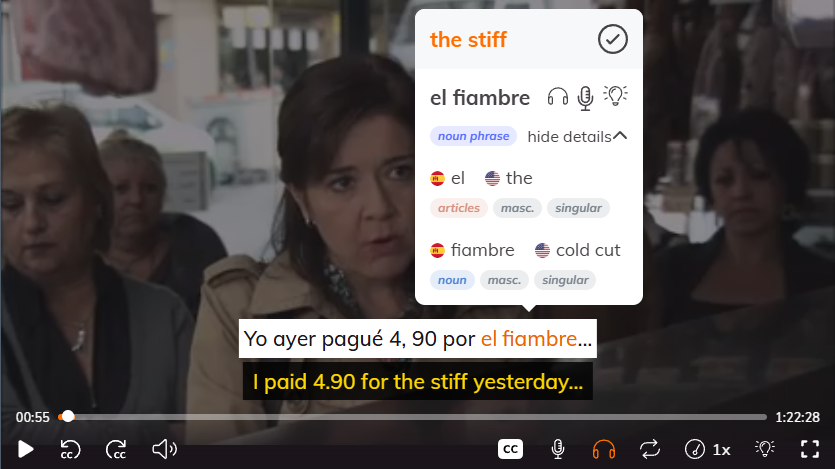Moving to a new country can feel a lot like being dropped into the Badlands. You don’t know the rules, you can’t read the signs, and even the simplest things like buying food or asking for directions can feel like a mission. In Predator: Badlands, the characters have to adapt quickly to survive.
And honestly, it’s not far from the fast thinking you’d expect from someone like John Wick, who has to read situations instantly and adjust on the spot.
In real life, it’s kind of the same. You might not be running from an alien, but you do have to figure out how to navigate a completely new world without much time to prepare.
In this post, we’ll talk about how to adapt fast when you suddenly find yourself in a new country and need to pick up the language as you go. You’ll learn a few simple ways to make the process easier, stay motivated, and actually enjoy the challenge.
- How To Write The Date In Chinese [Guide]
- How To Speak Korean: Classes, Apps, And Immersion Tips
- How Dual Subtitles Accelerate Language Learning (And Where to Find Them)

What is Predator: Badlands (2025)?
Predator: Badlands is a futuristic sci‐fi action film directed by Dan Trachtenberg, set for theatrical release on November 7, 2025. In a twist on the usual franchise formula, the story follows Dek, a young Predator alien who’s been cast out of his clan. On a remote planet filled with danger, he forms an unexpected alliance with Thia, a synthetic being caught up in the same lethal world.
What makes Badlands especially cool is how it flips what we expect from the franchise. Instead of humans hunting Predators (or vice-versa), this time the Predator is the one being hunted — and he has to adapt to survive.That idea of adaptation, survival and being thrown into a hostile environment is what makes this movie a strong metaphor for what learners face when they start a new language in an entirely new place.
And that’s where our conversation with Lingopie comes in. Just like Dek adjusts his instincts and finds his way in the Badlands, a language learner often has to dive in, learn fast, and draw on the right tools to begin feeling at home in a foreign tongue.
How to Adapt and Learn a New Language Fast
Immerse yourself from day one
When you move to a new country, your brain learns best by seeing and hearing the language in real situations. Do not wait until you feel ready. Surround yourself with it from the start. Watch local shows, listen to music, read signs, and try to follow conversations around you.
Tools like Lingopie make this easier because you can watch real movies and series in your target language, with subtitles that help you learn words in context. It feels more like watching for fun than studying, but your brain is learning the whole time.
Focus on survival language first
In the beginning, you do not need to speak perfectly. You just need to manage daily life. Learn how to ask for directions, order food, introduce yourself, or ask simple questions. These small wins build confidence and help you feel more connected to the people around you.
Once you can handle basic situations, you will start to understand more naturally. You can even find short everyday dialogues on Lingopie that match real-life scenarios so you can practice before you face them in person.

Turn mistakes into your greatest teachers
Everyone makes mistakes when learning a new language. Instead of feeling embarrassed, use those moments as lessons. Each time you mix up a word or use the wrong tense, you are learning what sounds right and what does not. Try repeating words or phrases you hear until they start to feel familiar.
Also, don't forget to rewatch scenes on Lingopie and mimic how characters speak. The more you experiment, the faster you will improve. Mistakes are not failures; they are proof that you are learning.
Build a routine that fits your life
Consistency is more important than long study sessions. Find small ways to include the language in your day. Maybe you watch one Lingopie episode while eating breakfast or practice new words on your commute. Short daily exposure helps your brain stay active and engaged.
Over time, you will notice yourself understanding more without even trying. What matters most is showing up a little each day, not doing everything at once.

Explore the culture behind the words
Language is more than grammar and vocabulary. It is also humor, emotion, and connection. The more you explore the culture, the more the language will make sense to you. Watch local movies, learn common expressions, and notice how people use gestures or tone.
On Lingopie, you can experience how native speakers express themselves in real stories and settings. It feels less like studying and more like discovering a new way of seeing the world.
Your 4-Week Language Survival Plan
When you move abroad unexpectedly, the first month is usually the hardest. You’re trying to settle into a new place while also learning how to communicate. Instead of trying to learn everything at once, focus on small wins each week.
Here’s a simple plan to help you build confidence and adapt quickly — all while using tools like Lingopie to make learning easier and more fun.
Week 1: Listen and Observe
Spend your first week tuning your ears to the language. Watch local shows or short clips on Lingopie every day. Listen to how people greet each other, how sentences flow, and what words repeat often. Try to pick out 10–15 useful phrases for everyday life. The goal this week is not to speak perfectly, but to start understanding the rhythm of how people talk.
Week 2: Speak in Small Steps
Start practicing basic phrases out loud. Order food, ask for directions, or introduce yourself to someone new. Do not worry about mistakes — just focus on being understood. Use Lingopie’s subtitles to repeat short lines from shows and copy pronunciation. By the end of the week, aim to have short, simple conversations without switching back to your native language.
Week 3: Expand Your Vocabulary
Now that you can handle simple situations, start learning words that fit your daily life — your work, school, or hobbies. Pick a show on Lingopie that matches your interests and watch it with interactive subtitles to collect new words. Write them down or create flashcards from your favorite scenes. Try using a few of those new words in real conversations.
Week 4: Immerse Fully
By the fourth week, start living as much as possible in the new language. Change your phone settings, follow local creators online, and watch shows without relying too much on subtitles. On Lingopie, rewatch your favorite episodes and see how much more you understand now. Celebrate your progress and notice how what once felt foreign now feels familiar.
Ready To Learn Something New?
Learning a new language can sometimes feel like stepping into your own version of the Badlands. It is unfamiliar, unpredictable, and at first, a little intimidating. But just like in Predator: Badlands, the key to survival is learning to adapt. Every new word you learn, every sentence you try to say, brings you one step closer to feeling at home in your new world.
If you want to make that process easier and more natural, give Lingopie a try. It lets you learn through the shows and stories people actually watch, so you pick up the real language that locals use every day. Instead of memorizing lists or repeating drills, you learn the way humans are meant to by listening, watching, and feeling the rhythm of real conversation. With a bit of curiosity and the right tools, you can turn any unfamiliar place into your own adventure.
So, what are you waiting for? Give Lingopie a try now!







![19 Best Spanish Series For Learning Spanish Fast [2026]](/blog/content/images/size/w300/2025/04/best-shows-to-watch-to-learn-spanish.jpg)

